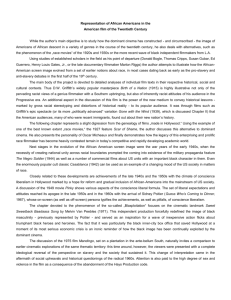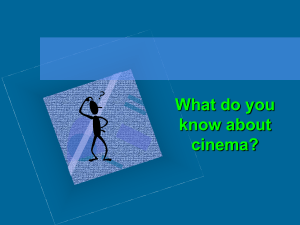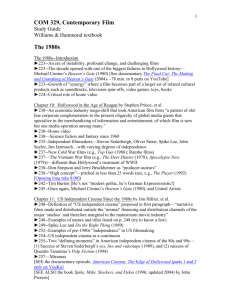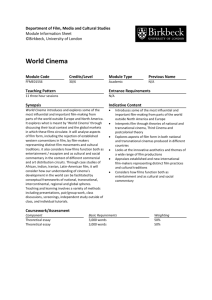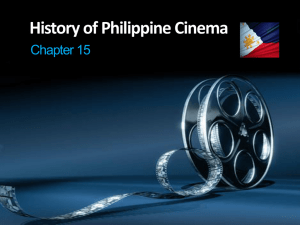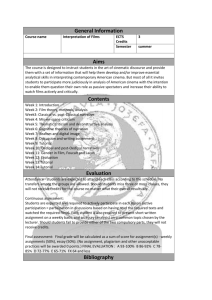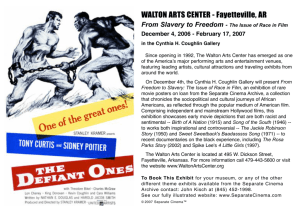Lord Puttnam of Queensgate CBE Again A Lecture delivered by
advertisement
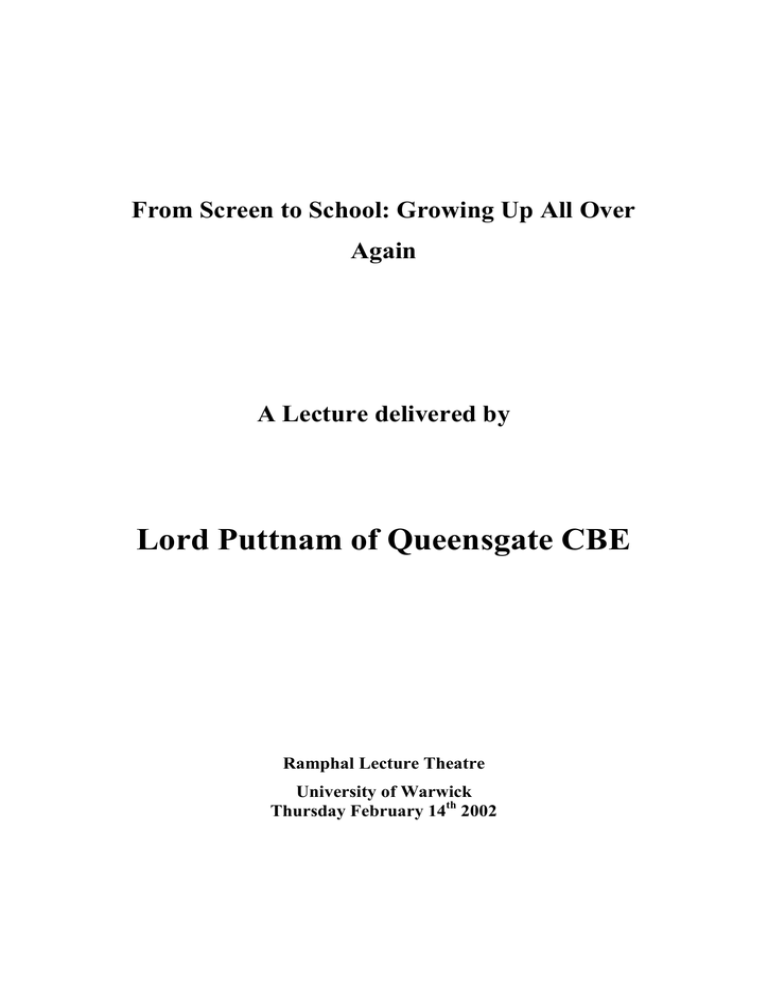
From Screen to School: Growing Up All Over Again A Lecture delivered by Lord Puttnam of Queensgate CBE Ramphal Lecture Theatre University of Warwick Thursday February 14th 2002 I was reminded of the importance of getting my own biographical details right during the Christmas holidays. I read a newspaper story about some difficulties the Italians have been having in translating into English the biographies of their own Government ministers. On the Italian Government website, the under-secretary to the Prime Minister Silvio Berlusconi was described thus: “E be for many years Head of the Office of Press of the National Federation of the Knights of the Job, and subsequently Head of the Office Studies and Documentation of the Agency of the Palace of the Civilisation of the Job!” The entry for the female minister for regional affairs read “Conjugated [I think they meant married] it has two daughters. In 1965, one has graduated in Economy near the University of Mouthfuls of Milan.” Finally, the community policy minister was described as having “graduated himself” under “the guide of Prof the Augusto of the Walnut.” I’ve worked out that this is a literal translation of the Professor’s name; della Noce. Let’s hope if and when if we enter the Euro such linguistic difficulties will be well and truly “sorted”! In many respects, these past few years have been a period of very considerable change for me. For a short while I tried my hand at being a filmmaker-educationalist! But somehow I always seemed to be “standing on the wrong set.” The conflicting priorities, and the almost insane divergence between the objectives of the two worlds soon proved irreconcilable. So three years ago I gave up film production for good, throwing myself instead into the world of education. What I’d like to do is offer you some thoughts on why, finally, I decided to “retire” from filmmaking and enter the world of education – and why I’d become increasingly disillusioned with the world of cinema. 2 Relatively late in life, I’ve made a change which many people find somewhat puzzling. I’m continually asked why on earth I left an industry from which, for thirty years, I derived far more pleasure than pain. That question is usually followed by another, why on earth did I - someone who left school at 16 with the barest minimum of qualifications – choose the field of education (the clear implication being – what a nerve!). I’ll begin by explaining what I originally found to be so compelling about the world of film, and by discussing some of the challenges that I’m trying to tackle in education; hopefully placing all of this in the context of the broader changes affecting our society; and how I increasingly find many of those challenges echoing those that lay behind my recent career decision. I originally billed my lecture as From Screen to School, about as anodyne a title as you will ever come across but it’s left me plenty of room for maneuver! The more I thought about it, the more I felt that I wanted to add a more telling sub-title: Growing Up All Over Again - For reasons, that I hope will become all too clear. My working life didn’t start in film. In fact, I’d already had two “careers” before I went anywhere near a movie set. Having started out as an advertising executive, a “suit”, I moved on to run an agency representing a large group of International photographers. It was only at the end of the sixties that I decided to take-on what appeared to me the ultimate challenge – a career in the movies. I had always loved cinema, ever since as a small boy I became a regular visitor to my local Odeon in North London, just one of five cinemas within easy walking distance. Remember walking?! That’s how old I am! The first film I ever saw was Pinocchio, to which I was taken by an aunt. I still remember how it felt coming out of that film, the words of the song “When You Wish Upon a Star” ringing in my ears. I distinctly remember thinking “I want to make people feel exactly like I feel now.” 3 Interestingly, the lyrics of that song continue to represent the essential idea that drove cinema almost from its inception. Those who make the movies, those who market and distribute them, and those who form their audience, are, or are encouraged to be, accomplices in this dream. They are urging us to set aside our individual troubles, and join together in the darkness, to borrow the pleasures and pains, loves and losses, laughter and tears, or triumphs or disasters of others. That at any rate, is what I have always believed film should offer – even if, for reasons I hope to explain, I’m no longer convinced that cinema understands, nor necessarily any longer particularly aspires to that collective dream. In one important sense my migration from Cinema to education wasn’t so odd. There has always for me been an absolutely fundamental link between the two because it was at the cinema that, to all intents and purposes, I acquired much of my early sense of what was really interesting about life. As a boy I would sit in the darkness and soak up the influence of films like Fred Zinneman’s The Search, William Wyler’s Best Years Of Our Lives, Elia Kazan’s On the Waterfront or a little later, Stanley Kramer’s Inherit the Wind. It was from films like these that just about every tenet, by which I have tried to live, somehow evolved. Many of them were sharply critical of American society, but they also demonstrated that capacity for a kind of infinite hopefulness, that “pursuit of happiness” so usefully and uniquely enshrined in the American constitution. 4 As a result of the intoxicating impact of those early cinematic experiences, the day I first went to America, in 1963, was, in many ways, the most significant day of my life. Part of me was coming home. Far more than any other influence, more even than home or school, my attitudes, dreams, preconceptions had been irreversibly shaped in Los Angeles, thousands of miles from my childhood home. Largely as a consequence of those early films, and their effect on me, I have remained profoundly aware that the responsibility implicit in creating these images (increasingly our principal means of conveying knowledge and understanding) is becoming, if anything, ever more potent - you really are tinkering around in people's minds, imprinting emotions, messages and ideas which may well influence them for life. An influence most filmmakers simultaneously yearn for, and for the most part, are terrified of acknowledging. Because film is such an extraordinary medium for conveying ideas, its power was recognised very early on by any number of sophisticated politicians. Lenin said that “Of all the arts, for us cinema is the most important.” American President, Woodrow Wilson went even further, calling cinema “The very highest medium for the dissemination of public intelligence,” adding that “since it speaks a universal language, it lends itself importantly to the presentation of America’s plans and America’s purposes.” That’s about as prescient as any politician has ever been! It remains true of the American movie industry today; you see its influence around the world, as American movies continue to dominate the marketplace – for although Harry Potter and Lord of Rings may be based on the work of British writers, they are, to all intents and purposes American films. And certainly the economic rewards of both films are reaped by just one giant American company, AOL Time Warner. But the truth as I see it, is that, in recent times, the Hollywood studios have failed to develop any real understanding of the effect of what, in the name of the free market, they’ve been doing for the past twenty-odd years. If they had bothered to develop any such understanding, then this might have mitigated some of the cultural resentment that has been inexorably developing in other less fortunate parts of the world. 5 Let me dwell for a moment on the emotional power of cinema, that same power that touched me as a small boy growing up in North London. Cinema is, or ought to be, the one true international language, touching the hearts and minds of audiences throughout the world. It should express and celebrate our most important experiences. Film has the power to mark-out the truly personal moments in each of our lives. Birth, death, love, family, in fact all of our great joys and losses; each and every one of those seemingly unique emotions is captured, immortalised and reflected back to us by the power of cinema. The American social philosopher, Eric Hoffer, synthesised this thought beautifully when he said, “it is not so much the examples of others we imitate, as the reflection of ourselves in their eyes, and the echo of ourselves in their words.” That is the essence of cinema – in the darkness Jimmy Stewart, James Dean, Tom Cruise are me. Katherine Hepburn, Meryl Streep, Nicole Kidman are you. Film should have remained, of its essence, a cultural form of great significance to today’s complex global society – most particularly during these turbulent and uncertain times. But, sadly, all too often over the past twenty-odd years filmmakers have failed to tap the real power and influence of cinema. Whilst becoming more and more skilled at exploiting its visceral impact they have, to a very great extent, abandoned the emotional subtlety and sophistication of the medium. In the wake of September 11th, many observers noted that the appalling images that day had all of the resonance of a contemporary Hollywood movie. Commentators reached time and again for cinematic analogies to describe the endlessly replayed horrors. The temptation to try to comprehend these images in cinematic terms was, in itself, a testament to the power of film – its ability to haunt our unconscious long after we’ve filed out of the darkness, trooping back to the sometimes mundane realities of our everyday lives. But somehow even this analogy felt entirely inadequate, and not just because of the momentous scale of the tragedy itself. 6 The movies, especially in Hollywood, have pretended that the “events” they portray have few, if any consequences. How often do we get a glimpse of what happens after the missile hits its target, what happens after a cop is shot dead, what happens after the guy being chased, loses his footing and falls from the tallest building in town? But of course, the images we watched on our television screens that terrible day had nothing but tragic consequences, consequences whose effects will be felt for years, probably decades to come. The world was indeed jolted well beyond the dreams of any contemporary moviemaker. For the most part present-day cinema has encouraged us to feel that we live in a world without consequences, without that many detectable values – outside of the brutal, the callous, the mindless belief that bloody violence, is somehow a heroic end in itself. So, the message becomes “Good will always triumph over evil just so long as sufficient blood is spilt.” For too long cinema has played with reality, played with it in such a way that actions are entirely divorced from their consequences. For too long sensation has come to eclipse almost everything else – bigger and better explosions that miraculously don’t kill the most important of the protagonists; spectacular plane crashes which the right people somehow survive; shootings which manage to create victims without widows or orphans! How many times do we see a cop walk up a garden path to tell a woman that her husband is dead? And then, perhaps, witness her having to decide whether to tell her twelve-year-old child who is about to appear in the school play? Should she tell him now, or wait until bedtime? This is the stuff of real human drama; these things are the consequences of tragic actions. Yet we almost never witness them! Perhaps filmmakers outside Hollywood, whether here in the UK or elsewhere, do venture to address these more complex issues; but not nearly often enough. It’s as if much of cinema had returned to its very earliest days – before it grew up – when all the audience demanded was the thrill of standing in front 7 of that Lumière Brothers train as it was about to run them over! In every respect cinema as a fairground spectacle. Indeed that’s exactly where its earliest impresarios came from. As I see it, there’s an unfortunate complicity here between financier, filmmaker and audience. All of them – all of us – are caught up in a cycle which none of us entirely controls – yet it’s effect is to reduce all of us, because it undermines the value of a medium which unquestionably possesses the power to affirm, and reaffirm, our common humanity. Unfortunately, as I’ve said, many if not most filmmakers when confronted with this moral power, go into a form of emotional denial. But not all! It’s particularly important to me that it was a filmmaker, the great Russian director Andrei Tarkovsky who, shortly before his death, said this: “The connection between man’s behaviour and his destiny has been destroyed; and this tragic breach is the cause of his sense of instability in the modern world…because he has been conditioned into the belief that nothing depends on him, and that his personal experience will not affect the future, he has arrived at the false and deadly assumption that he has no part to play in the shaping of even his own fate…I am convinced that any attempt to restore harmony in the world can only rest on the renewal of personal responsibility.” Whatever way you look at it there can be no doubt that filmmakers do carry a very real responsibility, most particularly in respect of the imaginative worlds they choose to portray – and the manner in which they portray them. So what would be my message to those filmmakers who share my disquiet at the direction our “extraordinary” medium is taking? Well, recently in Los Angeles I had occasion to speak to a group of young filmmakers at the American Film Institute – and to address just that very question. 8 I found myself using an analogy from my own experience of work back when I was in my twenties; early in my advertising career, I found myself working for an extraordinarily gifted taskmaster who I found it all but impossible to please. One day I really lost it with him and yelled, “What the hell do you want of me?” Somewhat to my surprise he said, “It’s simple: amaze me. You’re here to do things I can’t. Amaze me!” So, I laid down precisely the same challenge to those filmmakers at the AFI as representatives of a generation addressing an evermore complex world. What I said was: “Amaze me, with your commitment to squeezing the very best from your craft, whatever your specialisation may be. Amaze me, with the subtlety and sophistication with which you steal up on, excite, and inform your audience. Amaze me, with the ingenuity with which you persuade your finance and distribution partners to send out into the world the movie, and the message, as you originally conceived it. Amaze me, by telling your stories in such a way as to allow people, especially young people, to feel understood, valued and never alone. Amaze me, with the way in which you make, and leave a distinctive mark on your generation – not just in this country, but on millions of like-minded people around the world. Most important of all, amaze me with the maturity, wisdom, and compassion with which you are prepared to address genuinely complex issues.” And I concluded by saying, “In amazing me, and who knows, in amazing yourselves, you’ll be coming to terms with what, I think, Tarkovsky meant by ‘personal responsibility’.” 9 I hope that at least some of those filmmakers came away from that session with a renewed commitment to the potential of film as a life-affirming force, rather than as something which feeds off, without re-nourishing our imagination and our humanity. More than a hundred years after its invention, cinema has established itself as one of the most powerful and effective means of communication with which, not just to entertain ourselves, but express ourselves. We refer to Hollywood as ‘Tinseltown’, as if somehow it didn’t really matter. Some try to persuade us that films and television are a business just like any other. They are not. Films and television shape attitudes, create conventions of style and behaviour, and in doing so reinforce or undermine the wider values of society. The appeal of the movies is universal. As I’ve said, their stars provide a mirror in which we can see a heightened reflection of our own lives. Their stories can open a window through which we see and better understand the dreams of others. Cinema reflects or damages our sense of identity, as individuals and as nations. In these circumstances, it is frankly dangerous for Hollywood’s extraordinary dominance in the field of filmed entertainment to just go on intensifying. To do so presents the very real prospect of a fundamental “dislocation” between the world of the imagination created by the moving image, and the everyday lives of people around the globe. A whole world of misperception, misinformation and misunderstanding. We should recognise, for instance, that thousands or even millions of young people are growing up in refugee camps. Wherever they are in the world – every one of them is a living tinderbox, and whilst that situation continues to exist the potential for a devastating explosion will always remain. It’s important that we pause and reflect on the fact that a few, ill-chosen stereotypes, plots, and images can only help ignite that explosion – make it that much more inevitable. For years I’ve believed that this cultural “dislocation” has helped feed unfortunate but easily understandable levels of resentment. The process we call “modernisation” appears to be unstoppable, but, as Professor Sam Huntington has pointed out, modernisation and economic development do 10 not depend upon, or create, cultural “westernisation”. In fact, if anything, they tend to foster a renewed commitment to indigenous culture. The extraordinarily complex relationship between the cultural and the commercial power of cinema, which has featured so prominently throughout its history, looks set to continue or even grow in importance in the decades ahead. To pretend that such a sensitive and explosive issue can be neutralised by the alchemy of ‘free trade’ or by some manipulated theory of ‘globalisation’ is an illusion, especially in the context of an intensely competitive struggle for jobs and security throughout the whole of the world. Please ponder this as you go home this evening – the idea that those of us who inhabit free societies, can simply mouth a few platitudes about “freedom” and “democracy” as a universal right, or worse still, when damaged, take refuge in some medieval concept of “revenge”, is to ignore the very real complexities of the problems we face. Somehow we have to develop the ability to understand what powerlessness and a total loss of freedom feels like as an everyday reality – and what it inevitably leads to. Sadly, I don’t think the overwhelming majority of movies are helping us to develop very much judgement in this area! As Bill Clinton said in his Dimbleby Lecture just before Xmas, “Don't you think it's interesting that in this, the most modern of ages, the biggest problem, is the oldest problem of human society - the fear of the other.” And he might have added, the consequent refusal to try and understand the fears of the “other.” We see this in conflicts all over the world – not least in the Middle East – but, for the most part, cinema remains deaf, dumb and blind to such complexities. For myself, after thirty years of mostly ups and a few downs, I came to the conclusion that contemporary cinema was beset with a poverty of ambition that was far more serious than its poverty of imagination. It felt time to move on – to seek a new challenge. I had achieved a number of personal dreams – not least the Oscar for Chariots, I’d set out my personal stall in Local Hero, and produced the film of which I’m most proud, The Killing Fields. A film which continues to 11 have something powerful to say about the enduring quality of friendship, the brutality of war and – here’s that word again - its consequences. But contemplating a life beyond film, I began to examine what it was that drew me to the “public sphere” in the first place. And that in turn lead me to reflect on my own past, the society in which I grew up, and the vision of the future which had driven it. I was born into a world torn apart by war. But my generation did have one huge advantage. When I left school, I entered an environment of full employment and, what from today’s perspective, would appear an extreme degree of social and cultural certainty, and, even in the midst of war, an amazingly forward looking spirit. I was reminded of this a couple of weeks ago, when looking at an edition of the magazine Picture Post, published at the time I was born – early in 1941. Its theme was a Plan for Britain; and it was packed with articles on how to prepare a health service for all, education for all, social security for all – and remember, this is several years before the introduction of our National Health Service, and the restructuring of Education. Its aim was for “everybody to live in cheerful, healthy conditions, which only proper planning can ensure…there were plans for industry, housing, schools, hospital and transport.” I was amazed by the strength of aspiration, the genuine sense of idealism which prevailed at the time – and, this was published at a moment in history when any serious commentator would have judged Britain ripe for invasion – and fairly certain to lose the war! I even came across a “letter to the editor” which struck a very particular chord, entitled “More Films for Schools.” The writer a Mr. J. Elliott of London, said that it was high time we used “modern methods of instruction.” He continued; “Broadcasting to schools is an idea on exactly the right lines…Why can’t we have films for schools…I would like to see geography taught by films from different countries, made especially for that purpose; history might be treated in a similar way…Now, when many schools are under-staffed, such films would be immensely valuable in reducing the teacher’s workload.” 12 Sentiments I’m sure many teachers would empathise with today. I’ve been making a not dissimilar argument about the importance of the moving image to education for some years now. For while the world in general has witnessed an astonishing velocity of change, as I visit schools I’m always struck by how little classroom practice has in itself changed. Why? Because technology has not as yet had any significant impact on the process of learning. And yet, I would argue that the same frontiers of knowledge will be crossed in the next 20-25 years in the application of technology to the process of learning, that have marked the last 100 years in medicine. All this has significant implications for classroom and school, management. The model of 30 children in neat rows facing a single teacher is (or ought rapidly to be) an anachronism in an era of video-conferencing, email and interactive whiteboard technology. Why shouldn’t our children be helped to learn French by French children in French schools, or physics by a Nobel prize winner? Unless we find a way to harness the creativity our industry is capable of to the needs of our educational system, and then address the outcomes to the demands of our increasingly technological society, we will, in very short order, be facing a serious crisis; one that will affect every single one of us here this evening. Of that, I could not be more convinced. All of this is equally true whether you live in Warwickshire or in Wyoming, in Birmingham or Beijing -it really is a huge challenge for education systems across the world. But as well as arguing for the critical importance of bringing together the world of the moving image with that of education, I’ve also tried to apply other skills I learnt during my 30 years in the film industry. Most especially, those of leadership – of trying to motivate and inspire teams of people, and most particularly teachers. 13 As mentioned, I was trained in a world of hyphenates. Today’s teachers have themselves been increasingly required to become hyphenates. The ‘teacher social worker; the classroom assistant -playground monitor’, or the evermore-common ‘teacher–surrogate parent’. Probably the most remarkable hyphenate was the late Christa McAuliff, a genuinely heroic teacherastronaut. Before her tragic death in 1986 on the space shuttle Challenger, she said this: “Everyday I touch the future – I teach.” Well, I don’t teach, but working these past few years with the teaching profession I’ve come to believe that I have been allowed, however briefly, to “touch the future”. It’s been my enormous privilege to visit literally hundreds of schools, and to meet many thousands of teachers. Please believe me when I tell you that they are, without question, the most interesting and stimulating group of people I’ve ever worked with, and, for the most part, rather more entertaining than many of the ‘so-called’ entertainers I’ve known! Without teachers, learning dies. In fact, in my judgement, without a generation of good and confident teachers we have little or no future. In drawing to a close, let me try to place all of this into a hopefully coherent context. As has been dramatically apparent for the past few months we now find ourselves navigating a course through a frighteningly complex society. What this will come to mean to us as nations is not yet entirely clear, what is certain, is the overwhelming need for everyone of us to raise our game. We simply have no other choice. Like it or not this new “globalised reality” is here to stay. At troubled times like this our shared ambition can probably be reduced to the notion of some form of truly sustainable society; and we’ve enough experience to know that the key to this is a stable economy – an economy that offers the prospect of continuity and a genuinely better future for every one those struggling to exist at the margins, at it’s best it’s what we’ve come to call the quest for “social justice”. 14 Somewhat to my surprise, I’ve discovered that, in the end, for the most part, it’s left to those working in the public sector to deliver this “social justice” – or it’s unlikely to be delivered at all. That’s why I’m personally committed to the public sector, it’s why I’ve spent the past four years working entirely in the public sphere; after a lifetime spent in the world of commerce. These last few months have if anything, only underlined my belief that it is those in the public sector who, when disaster strikes carry the overwhelming burden of responsibility. They are the first in, and the last out. And tragically, some of them don’t make it out at all. All governments are effectively required to address the civilian equivalent of what the medical services call Triage; the sorting out of cases according to type, seriousness of injury, and likelihood of survival, in order to establish priority of treatment – painful and arbitrary as the process may be, this is the only way to ensure that limited resources are used as effectively as possible. For me, that priority absolutely has to be education. I’m not alone in believing that education, uniquely among all areas of public expenditure, is fundamentally both the cause, and the consequence, of a successful society. H.G. Wells once memorably described civilisation as a “race, between education and catastrophe.” Now more than ever we need to think about that. Otherwise we really will be caught up in a “War of the Worlds”; a war between the world of the “haves” and the “have-nots” – a war in which both sides can only be losers – and losers on a scale that could, this time, be quite terrifying. For the truth is we are, now more than ever, interdependent. It’s not just “us” against “them”. “Goodies” taking their revenge on the “Baddies” – That’s just a media fantasy! I recently came across a study by scientists from Israel’s Weitzmann Institute regarding a worrying mechanism that’s buried in the human visual system. It appears that our brain is flooded with a multitude of interpretations of the realities it faces every day, and that it must, in the end, decide in favour of one of them – and act accordingly. A fascinating interpretation of this is the hypothesis that, from the moment the brain decides in favour of a single interpretation of the images it is receiving, all 15 stimuli that support any other interpretation simply “disappear”. The brain, as it were, refuses to relate to them. In the impossible relationships that have existed in Northern Ireland, or more topically, between Israel and the Palestinians, both sides have for years suffered from almost complete blindness to reality’s complexity. Each is certain that the other side is ceaselessly deceiving it; that the other side does not want peace at all; that any suggestion of compromise is simply camouflage for an intrigue designed to being the other side victory, and the elimination of its own existence. There’s no need for scientific research to understand how easy it is to paint reality this way. In the words of the remarkable Israeli writer, David Grossman, “Each nation turns its darkest, most hateful, most bestial side to the other. Neither nation senses how deeply hatred and violence have seeped into its innermost organs – until they literally wear each other out, until they have no more strength to fight, until they reach the lowest level of human nature. Perhaps there, a moment before their final obliteration, they will catch themselves and do what it’s already clear that they must do – in other words, compromise, try to live beside each other, and not instead of each other.” He goes on to say “there is no escaping this conclusion: the Israeli brain and the Palestinian brain, which have never known a day of real peace, have been conditioned to perceive one unambiguous picture of reality: that of unending war, of the one-dimensional, stereotypical, monolithically hating, violent enemy.” The appointed role of the film maker and the journalist is to help explain the ambiguities, to find a way through the complexities, in such a way as to promote tolerance, understanding, compromise and eventually, who knows, even peace. I’m more than aware that we live in desperately challenging times, and that challenge is not just to our political or technological abilities but to our character. Let me close with one final quote. One which, incidentally, I first used in a speech at the American Embassy in London, in 1998. 16 It’s from the American journalist Walter Lippmann, who was, ironically, reflecting in the summer of 1940 on the perils of America’s determination to stay out of the war which, he believed, could in the long run lead to the destruction of America’s own carefully nurtured democracy. What he actually said was this: "You have lived the easy way; henceforth you will live the hard way. You came into a great heritage made by the insight and the sweat and the blood of inspired and devoted and courageous men; thoughtlessly, and in utmost self-indulgence you have all but squandered this inheritance. Now only by the heroic virtues which made your inheritance can you restore it again. You took the good things for granted. Now you must earn them again. For every right that you cherish, you have a duty, which you must fulfil. For every hope that you entertain, you have a task that you must perform. For every good that you wish to preserve, you will have to sacrifice your comfort and your ease. There is nothing for nothing any longer." Those fairly uncompromising words could well serve as a guide for all of us – and in particular to filmmakers - as we attempt to set a course for the next decade or more; recognising that unless we look forward and not back, unless we look beyond the personal, the expedient, "the quickly achievable", the selfish; unless we come to see ourselves as an essential part of a constructive community of individuals, of family, of regions, of nations - all of which are irreversibly interconnected; then we are unlikely to remain really true to ourselves, let alone to any collective ideal of freedom and democracy. 17
